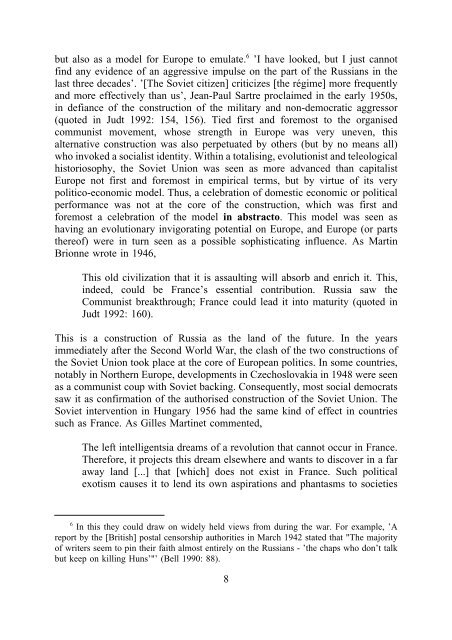RUSSIA AS EUROPE'S OTHER Iver B. Neumann European ...
RUSSIA AS EUROPE'S OTHER Iver B. Neumann European ...
RUSSIA AS EUROPE'S OTHER Iver B. Neumann European ...
Create successful ePaper yourself
Turn your PDF publications into a flip-book with our unique Google optimized e-Paper software.
ut also as a model for Europe to emulate. 6 ’I have looked, but I just cannot<br />
find any evidence of an aggressive impulse on the part of the Russians in the<br />
last three decades’. ’[The Soviet citizen] criticizes [the régime] more frequently<br />
and more effectively than us’, Jean-Paul Sartre proclaimed in the early 1950s,<br />
in defiance of the construction of the military and non-democratic aggressor<br />
(quoted in Judt 1992: 154, 156). Tied first and foremost to the organised<br />
communist movement, whose strength in Europe was very uneven, this<br />
alternative construction was also perpetuated by others (but by no means all)<br />
who invoked a socialist identity. Within a totalising, evolutionist and teleological<br />
historiosophy, the Soviet Union was seen as more advanced than capitalist<br />
Europe not first and foremost in empirical terms, but by virtue of its very<br />
politico-economic model. Thus, a celebration of domestic economic or political<br />
performance was not at the core of the construction, which was first and<br />
foremost a celebration of the model in abstracto. This model was seen as<br />
having an evolutionary invigorating potential on Europe, and Europe (or parts<br />
thereof) were in turn seen as a possible sophisticating influence. As Martin<br />
Brionne wrote in 1946,<br />
This old civilization that it is assaulting will absorb and enrich it. This,<br />
indeed, could be France’s essential contribution. Russia saw the<br />
Communist breakthrough; France could lead it into maturity (quoted in<br />
Judt 1992: 160).<br />
This is a construction of Russia as the land of the future. In the years<br />
immediately after the Second World War, the clash of the two constructions of<br />
the Soviet Union took place at the core of <strong>European</strong> politics. In some countries,<br />
notably in Northern Europe, developments in Czechoslovakia in 1948 were seen<br />
as a communist coup with Soviet backing. Consequently, most social democrats<br />
saw it as confirmation of the authorised construction of the Soviet Union. The<br />
Soviet intervention in Hungary 1956 had the same kind of effect in countries<br />
such as France. As Gilles Martinet commented,<br />
The left intelligentsia dreams of a revolution that cannot occur in France.<br />
Therefore, it projects this dream elsewhere and wants to discover in a far<br />
away land [...] that [which] does not exist in France. Such political<br />
exotism causes it to lend its own aspirations and phantasms to societies<br />
6 In this they could draw on widely held views from during the war. For example, ’A<br />
report by the [British] postal censorship authorities in March 1942 stated that "The majority<br />
of writers seem to pin their faith almost entirely on the Russians - ’the chaps who don’t talk<br />
but keep on killing Huns’"’ (Bell 1990: 88).<br />
8

















